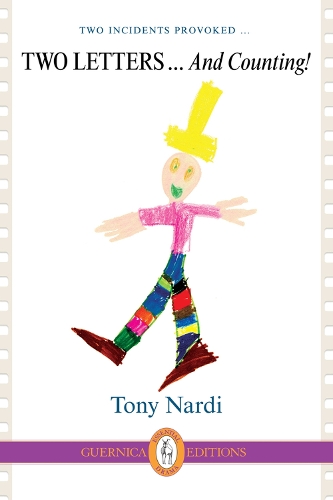
Two Letters ... And Counting!
Publishing Details
Two Letters ... And Counting!
By (Author) Tony Nardi
Guernica Editions,Canada
Guernica Editions,Canada
5th September 2013
Canada
Classifications
General
Non Fiction
Other performing arts
Literary studies: general
792.7
Physical Properties
300
Width 152mm, Height 228mm, Spine 25mm
Description
Although he has won plaudits and awards for work in film, television, and on stage, Tony Nardi's most recent headlines have been earned by his Three Letters, in which he is the only actor who reads letters he has composed and that address a variety of social, cultural, and professional subjects. These Letters are not at all like other dramatic monologues -- Spalding Gray's or Joan Didion's "The Year of Magical Thinking" or Quentin Crisp's "The Naked Civil Servant" or any other of a very broad genre -- because they are not meant to be simply memoirs or epistles. For one thing, they are studded with phrases and sentences in French and Italian rather than being all in English. The Letters also constitute a long, serial J'accuse, where each monologue has been provoked by a distinct experience.
Reviews
... [A] sweeping cultural critique, a cri de coeur that is perhaps the first extended work of its kind to attempt to decolonize the Canadian imagination ... surely one of the strangest and most provocative pieces of theatre ever staged in this country ... Nardi doesn't just bite the hand that feeds him; he chews it up and then spits it out.
--Michael Posner, Globe and Mail... [T]here is far more theatricality in his presentation than in many plays, because the actor knows exactly how to dramatize his material ... a representation of what it means to be in the authentic present, something every actor needs to know. This is a stunning model of period acting, and it is created without fanfare, without absurd artifice, and with such convincing intensity that it absorbs us in its surging current. In England, Italy, Germany, et cetera, Two Letters would be front-page news on the arts or culture page. Not so in Canada, of course.
--Keith Garebian... [U]n virulent plaidoyer contre la complaisance du milieu thtral, l'ignorance de la critique, l'incomptence des metteurs en scne et j'en passe ... la performance oscille constamment entre la narration et le pamphlet. Et a frappe fort. toute allure, comme s'il tait matre d'oeuvre d'un vritable bombardement, Nardi attaque de toutes parts. Des prises de parole de ce genre-l, on n'ose mme pas en rver dans le milieu francophone qubcois. Pourtant, la situation est bien peu diffrente ... Ceux qui ne voient pas de thtre dans la srie de lettres qu'il lit, ou plutt qu'il performe depuis plusieurs mois entre Toronto et Montral doivent tre sourds ou aveugles. Passons vite sur les qualits de prsence et la fougue du comdien, car ce serait oublier l'essentiel. Ce qui compte, c'est que Tony Nardi dit des choses importantes, que personne d'autre que lui n'ose dire avec autant de passion.
--Philippe Couture, Le DevoirNardi uses dramatic acid to burn the rust off truth, and to blister complacency until it turns into awareness. He takes no prisoners ... The questions that troubled him so deeply have to do, not just with identity and cultural stereotyping, but also with the nature of storytelling. To see Nardi in action is a bit like witnessing spontaneous combustion in a cave at night; at first, there is the scent of sulphur; then, a vague crackling in the air; then a flash of light, and the play of shadow on the walls; above all, there is surprise.
--Joe Fiorito, The Toronto StarTony Nardi's "letters" is the clearest most powerful statement ever made in Canada of the actor's art in modern times. Nardi's letters are a scream into the mouthless void of the destruction and desolation row of the Canadian Cultural agenda, one which has reduced the actor's role to that of corporatist marionette in the pocket of petty bureaucrats and the letters are an act of intellectual and cultural and perhaps even spiritual, terrorism. They curdle the blood much in the same way that Antonin Artaud's manifesto, The Theatre and Its Cruelty, predicted the holocaust and the Nazi and Fascist approach of a new and controlled barbarism, never seen before.
--Nick MancusoAuthor Bio
Luise von Flotow is a translation studies professor at the University of Ottawa. She lives in Ottawa, Ontario. She has translated six previous books for Guernica, including "Theorets Girls Closed In".
